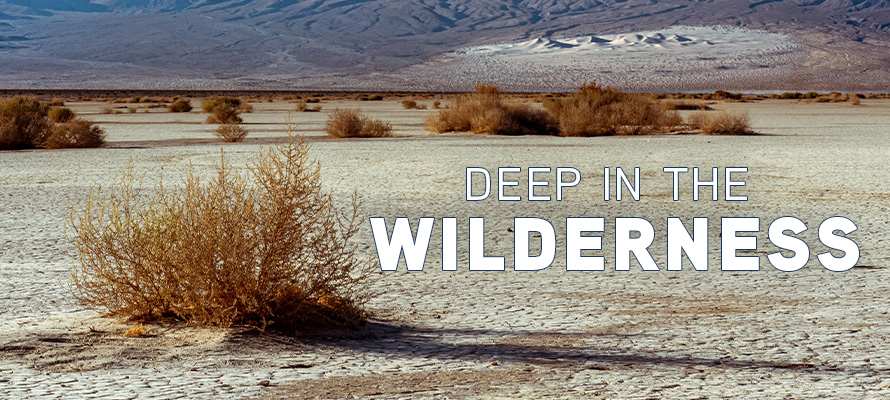
We’re coming to a close on the fourth week of Lent. A month ago, we solemnly celebrated Ash Wednesday; a time of repentance, humility, and remembering that to dust we will one day return. Dust, the simplest of earthly “ingredients.” Common to anywhere and everywhere, it is nowhere close to extravagant or unique. It is this element that we came from, and this element that we will someday be once again.
Remembering this stark fact allows us to look at our lives in a different light; it makes us take an inventory on the complexities and comforts that we have made ordinary in our day-to-day. But we are but dust, and we don’t need all that this world has to offer. We shed the extras of our lives as we walk into the Lenten season – we cross from the world of excessive pleasures into a physical and spiritual desert for the next 40 days.
Then Moses led Israel forward from the Red Sea,
and they marched out to the wilderness of Shur.
Exodus 15:22
In the beginning, it is new and exciting. We are determined, we are strong. We will have a good Lent – the best Lent– where we will not cheat on our promises or become disheartened. At the end we will rise victorious in our quest and will sing aloud during that Easter Mass – proud of ourselves and all that we have accomplished.
Then Moses and the Israelites sang this song to the LORD:
I will sing to the LORD, for he is gloriously triumphant;
horse and chariot he has cast into the sea.
My strength and my refuge is the LORD,
and he has become my savior.
This is my God, I praise him;
the God of my father, I extol him.
Exodus 15:1-2
But before we can reach the end, we must endure the entire journey. A few weeks go by, and the wind has slowly emptied from our sails. The things that would once bring us the joy of conquering our distance from God are now our enemies. The voids of what once were in the usual day are growing bigger and emptier. Instead of being an obstacle to our relationship with God, they are now the obstacle to what will bring us quick and cheap happiness. We grow irritated, we wish for it to end – how is this even helping my spiritual journey?
Here, then, in their thirst for water, the people grumbled against Moses, saying,
“Why then did you bring us up out of Egypt? To have us die of thirst with our children and our livestock?”
So Moses cried out to the LORD, “What shall I do with this people?
A little more and they will stone me!”
Exodus 17:3-4
We become lethargic in our original mission, to have a fruitful and life-giving Lent, one that will reveal to us all the things of our hearts and bring us closer to God. Temptation starts to win, slowly at first, and then more often as we rationalize how this quick pleasure will actually benefit us in the long run. The thoughts that come to mind are ones of defeat, just giving up, and if I can’t do the whole thing right, I might as well just stop now.
He received their offering, and fashioning it with a tool, made a molten calf. Then they cried out, “These are your gods, Israel, who brought you up from the land of Egypt.”
On seeing this, Aaron built an altar in front of the calf and proclaimed,
“Tomorrow is a feast of the LORD.”
Early the next day the people sacrificed burnt offerings and brought communion sacrifices.
Then they sat down to eat and drink, and rose up to revel.
Exodus 32:4-6
That brings us to today, half-way through Lent. Where our dedication to the liturgical season may have become halfhearted or weary, where Easter Sunday still seems worlds away. Our slip ups may be building up in our minds, on the imaginary tally of times we have failed. The Lord is with us in this, He sees our struggles, and He endures them at our sides.
They have quickly turned aside from the way I commanded them, making for themselves a molten calf and bowing down to it, sacrificing to it and crying out, “These are your gods, Israel, who brought you up from the land of Egypt!”
Exodus 32:8
As we enter into the second half of our Lenten journey, despite our falls, our lack of motivation, or our thoughts of unimportance in this practice of material deprivation, let us regroup and continue forward. In the midst of nothingness, it’s even easier to hear the prompts of the devil, to feel weak when not propped up by the things of this world. Our fallen nature gives way to sin, but Christ came to conquer the consequence of falling. For “God so loved the world that he gave His only begotten Son,” and He will not abandon us in this walk.
If you have fallen short, start anew. If you feel more temptation to fail, know you are in good standing as Jesus Himself was even tempted in the desert. Whatever you do, do not think your practice is in vain – for each step of mortification in this world is preparation for the next.




